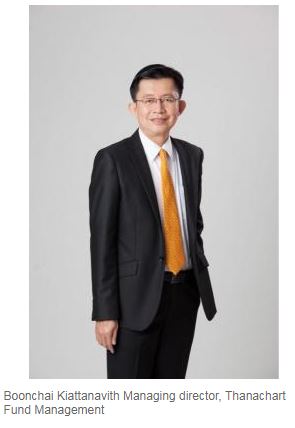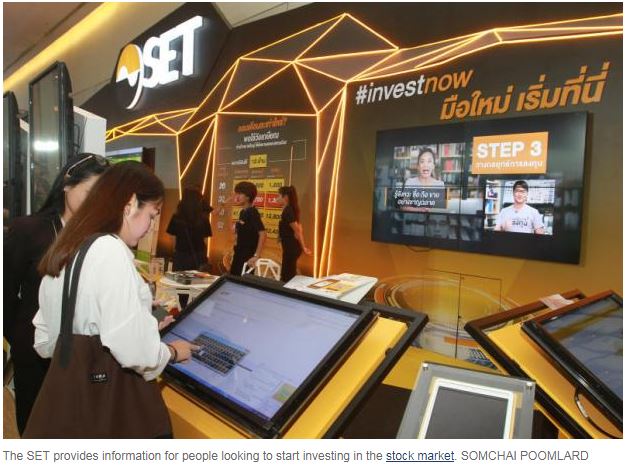Thailand: Investor obstacle course
Investors have had a tricky 2018, particularly in equities, as the Federal Reserve’s monetary tightening policy, which saw several central banks follow suit, led to a continued sell-off of Thai shares by foreign investors.
The trade spat between the world’s top economies and a local interest-rate hike have not helped the Thai bourse.
The benchmark SET index is down 9% as the year draws to a close, compared with a 13.7% gain in 2017.
The US-China feud appears to be deepening after the arrest of Huawei’s chief financial officer, and Thailand’s interest rate is expected to increase gradually. The political climate in the wake of February’s scheduled general election could weigh on investment sentiment over the next 12 months.
Securities analysts and fund managers believe that domestic plays will outperform bonds and other investment assets, pointing to stronger private and public investment and improving domestic consumption.
Wild swings in stock markets are expected to continue into next year and create a more difficult environment.
Below are investment strategies and asset allocation recommendations by analysts and fund managers for 2019.
Boonchai Kiattanavith
Managing director, Thanachart Fund Management 
Thai equity looks more attractive than global stocks, while returns from bonds remain limited due to the gap between the US long-term bond and Thai government bonds.
Selective buying with a focus on domestic plays is recommended for local stock market investment.
The prediction is based on assumptions that the global economy will cool down, weighed by trade protectionism and the global interest rate hikes, while domestic demand is expected to provide a buffer for the economy.
If the US-China negotiations fail to reach any conclusions in March 2019, when the truce ends, the tariffs will continue to deal a blow to Thai exports.
Given that Thailand’s stronger domestic economy will help cushion the impact from the global economic slowdown next year, Thai shares are expected to outperform other emerging markets and even some developed countries.
The Thai stock market looks more attractive than global stocks next year. Our economic fundamentals and listed companies remain solid; politics appears to be the sole risk factor. The SET index is targeted in a range of 1,790-1,850 in 2019, while the baht will move in a band of 32-33.5 against the US dollar.
I recommend investors allocate 40% each to fixed income and stocks and the remaining 20% in alternative investment.
Prakit Sirivattanaket
Vice-president, Kasikorn Securities 
The most attractive Thai shares next year are domestic plays, in sectors that will boost economic growth next year. These sectors are commerce, agro-business, civil contractors, big banks, ICT and residential property.
Commerce will benefit from the government’s welfare and subsidy scheme for low-income earners and improving domestic consumption.
CP All Plc (CPALL) and Berli Jucker Plc (BJC) are recommended investments for the sector.
The lingering growth momentum in exports, albeit at a slower pace, higher farm product prices, a potential windfall of falling raw material costs such as soybeans, and the still-strong earnings momentum in the near term will lend support to the agribusiness sector.
I recommend investors pile up on Charoen Pokphand Foods Plc (CPF) and GFPT Plc (GFPT).
The imminent bidding for infrastructure megaprojects, the large backlog and steel prices that have already peaked will be a boon to civil contractor stocks. CH Karnchang Plc (CK) and Sino-Thai Engineering and Construction Plc (STEC) are top picks in the sector.
Big banks are expected to beat this year’s performance in light of rising loan growth, a possible wider net interest margin (NIM) and lower provisions for credit loss amid improving asset quality. Bangkok Bank (BBL) and Krungthai Bank (KTB) are the recommendations.
The ICT sector is recommended, given the telecom regulator’s plans to extend the payment period for the 900- and 1800MHz licences, and the redesign of auction conditions and spectrum evaluation to ease the financial burdens of mobile operators, their improving earnings, an easing competitive environment and the expectation that there will be no major capex requirements for 5G.
True Corporation Plc (TRUE) and Jasmine Broadband Internet Infrastructure Fund (JASIF) are the sector’s top picks.
For residential property, the impact from the Bank of Thailand’s curbs on mortgage lending, effective from April 1, 2019, have already been priced into the sector’s share prices.
Land and Houses Plc (LH), Origin Property Plc (ORI) and Quality Houses Plc (QH) are recommended.
Thanavut Pornrojnangkool
Chief investment officer, BCAP Asset Management 
Global asset allocation is the 2019 investment theme amid wild swinging markets, weighed by the global upward interest-rate trend, the slowing economy and the US-China tit-for-tat tariffs.
Asset diversification is suggested amid the choppy market. However, asset allocation could be a difficult task for individual investors, so I recommend they put money into flexible funds. I expect to see more investors taking a holistic approach to investment portfolios.
High volatility is expected to continue next year, the magnitude of which will not be lower than this year, as the global economy slows following several years of growth.
We recommend investors be more cautious and adopt a global asset allocation approach to diversify risks. Equity investment ratio should be lowered and switched to alternative investment.
The proportion of asset allocation depends on each investor’s risk appetite, but the portion of risky assets should be reduced.
If equity makes up 70% of individual investors’ portfolios, they should cut the investment by 10-15% and shift to other assets, including government bonds in developed countries such as the US, gold, oil, property real estate investment trusts (REITs) or buy on the dip for stocks with strong fundamentals with an aim of generating higher returns when the stock market recovers.
Win Phromphaet
Chief investment officer, CIMB Principal Asset Management
Investors are expected to latch onto Thai shares in the coming year on the back of improving fundamentals and attractive fair valuation, but the market will move sideways.
Tailwinds for the stock market include the upcoming general election, the continuity of private and public investment and the recovery of Chinese arrivals.
The benchmark SET index is estimated to move in a range of 1,600-1,850 points next year, representing earnings per share (EPS) growth of 8-10%.
Valuation of emerging-market Asia-Pacific is also attractive in terms of price to earnings (P/E) and price per book (P/B) ratios. At the end of October, the P/E of MSCI Asia ex Japan was 10.6 and MSCI China A was 9.4, below MSCI AC World at 13.8, MSCI Europe at 13.6 and MSCI USA at 15.7.
China and Vietnam equities are in fundamentally solid markets with low valuations.
The US-China trade feud and the global equity’s sell-off are negative factors that should be of concern.
For other investment asset, Asia-Pacific REITs are interesting choices, given solid fundamentals and relatively cheaper valuation in the Singapore market. Dividend yields from the REITs are expected at 5-6% next year.
Amid the upward interest rate trend, I recommend investors avoid long-dated bonds.
The 10-year government bond, for instance, has yield spikes of 2.8% from 2.5% as the market bets that the Bank of Thailand will lift the policy rate again in the coming months.
I suggest investors increase the investment weight of Thai shares when the SET index hovers just shy of the 1,600-point psychological level.
Investors should allocate more into equities in Asia-Pacific such as Asia ex Japan, Japan, China, Vietnam and Korea, as well as global REITs and Singaporean REITs.
Pouring money into gold is recommended when the metal’s price trades below UScopy,200 per ounce.
For fixed income, piling up short-ended notes or holding until maturity (especially for corporate bonds) is recommended because of short-term yields climbing to 1.5-2%.

Source: https://www.bangkokpost.com/business/finance/1599870/investor-obstacle-course


 Thailand
Thailand




